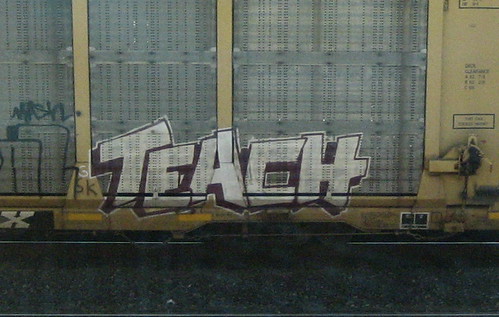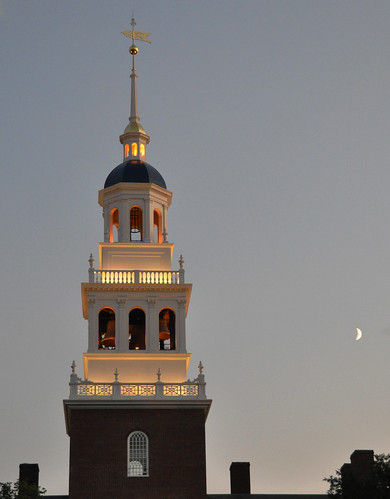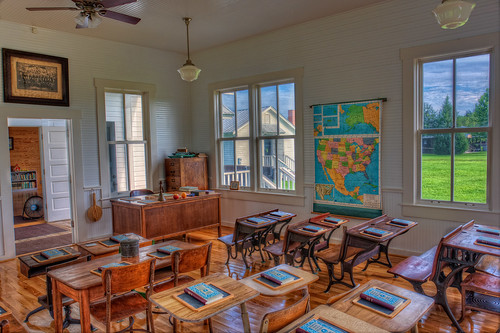Faculty Research: Designing History's Future with Karl Hagstrom Miller
 It should come as no surprise that we at AMS :: ATX headquarters love projects that delve into the digital world. One of our faculty members, Dr. Karl Hagstrom Miller, is working on the ever-fascinating Course Transformation Project with the UT History Department to "reimagin[e] what it means to teach and learn history." The project includes a blog with content from Karl's graduate seminar in the department, "Designing History's Future," a compendium of online resources about history pedagogy and research, an extensive bibliography, and a series of Friday afternoon workshops.Here's an excerpt from a write-up about the endeavor from Karl - the full post can be found here:
It should come as no surprise that we at AMS :: ATX headquarters love projects that delve into the digital world. One of our faculty members, Dr. Karl Hagstrom Miller, is working on the ever-fascinating Course Transformation Project with the UT History Department to "reimagin[e] what it means to teach and learn history." The project includes a blog with content from Karl's graduate seminar in the department, "Designing History's Future," a compendium of online resources about history pedagogy and research, an extensive bibliography, and a series of Friday afternoon workshops.Here's an excerpt from a write-up about the endeavor from Karl - the full post can be found here:
Penne Restad and I, in consultation with other history faculty, developed the basic plan for the project. But we have no idea how it is going to turn out. That is by design.One of our major goals is to re-imagine the way we teach our US history survey courses. “United States, 1492-1865” and “United States Since 1865” are the backbone of the UT history department. These two courses enroll about 4,500 students annually. That’s a lot of students. It’s also a lot of faculty and a lot of graduate teaching assistants. Our goal is to develop ways for these students to learn more and learn better. For us, that means moving away from the lecture format towards more active and collaborative learning, designing a course in which students engage in doing history rather than watching it done by others. We don’t know what that is going to look like yet. We’ve got a load of ideas, but we will be developing, refining, and implementing them over the coming year. Keep posted.We also hope to foster a broader conversation about teaching and learning history among our faculty, our students, and anyone else who is interested. The issues facing those who take and teach the US survey are far from unique. They resonate across the department and the university. Many, of course, resonate across the field of higher education. From student engagement and success to the paradoxes of systematic assessment in the humanities, from debates about active and situated learning to the existential challenges and exciting opportunities offered by digital technology, from graduate funding and placement to faculty research and retention: we often find ourselves working on contested and congested terrain. It is not always clear which way to travel or whether the paths we forge today will still be viable routes tomorrow. We do think that practicing teachers are in the best position to work out solutions to these complex issues while preserving and improving the quality of student learning. We hope that the history CTP will provide faculty and graduate students opportunities to debate these issues and collaborate on new designs for teaching history well into the future.
For more about American Studies at UT, subscribe to our newsletter here.
Announcement: Thomas Frank's Take on Higher Education in The Baffler
 We recently announced the exciting news that Thomas Frank and John Summers, editors of The Baffler, will be joining the Department of American Studies for a spirited conversation on the future of higher education on October 30. Today, we offer an excerpt of a piece called "Academy Fight Song" that Frank published about the topic for their most recent issue. Expect the event to address and spring off of the arguments that Frank makes here.
We recently announced the exciting news that Thomas Frank and John Summers, editors of The Baffler, will be joining the Department of American Studies for a spirited conversation on the future of higher education on October 30. Today, we offer an excerpt of a piece called "Academy Fight Song" that Frank published about the topic for their most recent issue. Expect the event to address and spring off of the arguments that Frank makes here.
The university deals in dreams. Like other utopias—like Walt Disney World, like the ambrosial lands shown in perfume advertisements, like the competitive Valhalla of the Olympics—the university is a place of wish fulfillment and infinite possibility. It is the four-year luxury cruise that will transport us gently across the gulf of class. It is the wrought-iron gateway to the land of lifelong affluence.It is not the university itself that tells us these things; everyone does. It is the president of the United States. It is our most respected political commentators and economists. It is our business heroes and our sports heroes. It is our favorite teacher and our guidance counselor and maybe even our own Tiger Mom. They’ve been to the university, after all. They know.[...]Another fact: This same industry, despite its legal status as a public charity, is today driven by motives indistinguishable from the profit-maximizing entities traded on the New York Stock Exchange.The coming of “academic capitalism” has been anticipated and praised for years; today it is here. Colleges and universities clamor greedily these days for pharmaceutical patents and ownership chunks of high-tech startups; they boast of being “entrepreneurial”; they have rationalized and outsourced countless aspects of their operations in the search for cash; they fight their workers nearly as ferociously as a nineteenth-century railroad baron; and the richest among them have turned their endowments into in-house hedge funds.[...]Grant to an industry control over access to the good things in life; insist that it transform itself into a throat-cutting, market-minded mercenary; get thought leaders to declare it to be the answer to every problem; mute any reservations the nation might have about it—and, lastly, send it your unsuspecting kids, armed with a blank check drawn on their own futures.Was it not inevitable? Put these four pieces together, and of course attendance costs will ascend at a head-swimming clip, reaching $60,000 a year now at some private schools. Of course young people will be saddled with life-crushing amounts of debt; of course the university will use its knowledge of them—their list of college choices, their campus visits, their hopes for the future—to extract every last possible dollar from the teenage mark and her family. It is lambs trotting blithely to the slaughter. It is the utterly predictable fruits of our simultaneous love affairs with College and the Market. It is the same lesson taught us by so many other disastrous privatizations: in our passion for entrepreneurship and meritocracy, we forgot that maybe the market wasn’t the solution to all things.
The full article is available here.For more about American Studies at UT, subscribe to our newsletter here.
Alumni Voices: Adam Golub Writes on High School and College Teaching
 Our alumni continually impress us with the work that they do after leaving UT. Today, Ph.D. alumnus Adam Golub, now an associate professor of American Studies at California State University - Fullerton, has published an inspiring and useful essay in Hybrid Pedagogy on how teaching high school prepared him to teach at the college level. We've posted an excerpt below and the full article can be found here.
Our alumni continually impress us with the work that they do after leaving UT. Today, Ph.D. alumnus Adam Golub, now an associate professor of American Studies at California State University - Fullerton, has published an inspiring and useful essay in Hybrid Pedagogy on how teaching high school prepared him to teach at the college level. We've posted an excerpt below and the full article can be found here.
Teachers in higher education who may be frustrated with an institutional culture that does not always promote formal training or even encourage informal dialogue about pedagogy might helpfully turn to our K-12 colleagues as a resource. The mentoring and instruction I received as a high school teacher provided me with a conceptual vocabulary and a habit of mind with which to approach university teaching and curriculum design. This essay focuses on the pedagogical convergences between secondary and higher education, drawing from my own experience as someone who has taught high school students, college students, and future high school teachers. In the process, I make the case that discussions about pedagogy can constitute a common ground -- a way to bridge the university/secondary divide and engender more productive discourse and collaboration among teachers in both settings. Such dialogue could, I believe, generate more expansive definitions of what teaching means in higher education, definitions that move beyond lecture, discussion, and the use of technology.